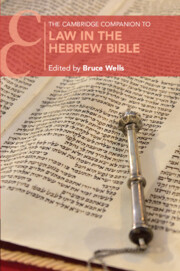Book contents
- The Cambridge Companion to Law in the Hebrew Bible
- Cambridge Companions to Religion
- The Cambridge Companion to Law in the Hebrew Bible
- Copyright page
- Contents
- Contributors
- Abbreviations
- Introduction
- Part I The Historical Context of Biblical Law
- Part II The Biblical Legal Collections
- Part III The Biblical Laws
- Part IV Biblical Law and Other Scriptural Discourses
- Part V The Legacy of Biblical Law
- 12 Biblical Law and the Dead Sea Scrolls
- 13 Biblical Law and the New Testament
- 14 Biblical Law and Rabbinic Literature
- 15 Biblical Law and Early Christian Interpretation
- Bibliography
- Subject Index
- Text Index
- Cambridge Companions To Religion (continued from page iii)
- References
12 - Biblical Law and the Dead Sea Scrolls
from Part V - The Legacy of Biblical Law
Published online by Cambridge University Press: 11 April 2024
- The Cambridge Companion to Law in the Hebrew Bible
- Cambridge Companions to Religion
- The Cambridge Companion to Law in the Hebrew Bible
- Copyright page
- Contents
- Contributors
- Abbreviations
- Introduction
- Part I The Historical Context of Biblical Law
- Part II The Biblical Legal Collections
- Part III The Biblical Laws
- Part IV Biblical Law and Other Scriptural Discourses
- Part V The Legacy of Biblical Law
- 12 Biblical Law and the Dead Sea Scrolls
- 13 Biblical Law and the New Testament
- 14 Biblical Law and Rabbinic Literature
- 15 Biblical Law and Early Christian Interpretation
- Bibliography
- Subject Index
- Text Index
- Cambridge Companions To Religion (continued from page iii)
- References
Summary
This chapter examines the texts surviving from Qumran and the surrounding area and how their tradents understood the nature of biblical law. It will identify and describe the interpretive strategies reflected in the scrolls for both harmonization and creative reuse of biblical law.
- Type
- Chapter
- Information
- The Cambridge Companion to Law in the Hebrew Bible , pp. 241 - 260Publisher: Cambridge University PressPrint publication year: 2024

